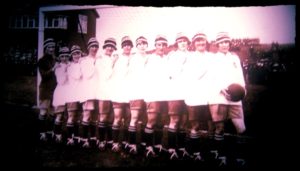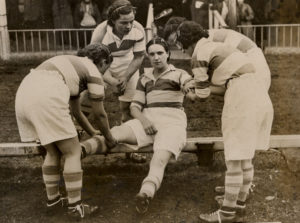The Rise and Fall of Early UK’s Women’s Football
On Monday the 22nd of March the BBC announced that they would broadcast the Women’s Super League, free to all, on a three-year contract. It comes as a landmark victory for women’s sport which has always had less coverage than the men’s game. Women’s sport is more prominent than ever before thanks to the slow integration of female sports with the men’s, but for football, in particular, the obstacles have been numerous.
It is only recently, perhaps within the last 20 years, that we hear more commonly about women playing football professionally. And, although, we are hearing more about women’s teams and players, the story of the first women’s team still remains a mystery to many.
The month of March is National Women’s History Month, the Sports Gazette decided to look at the first UK female football teams.
We find the earliest record of a female football team in the late 19th century. Scottish suffragette Helen Matthews founded Ms. Graham’s XI in 1881. The team recorded their first match at Edinburgh’s Easter Road Stadium on 9 May 1881. Just one week after their first match, an attempt to establish women’s league football was abandoned after a violent protest.
In the male-dominated 19th century, the awakening of female football teams shocked England. Men controlled the entire society – including sport. A woman who plays football outside. What an iniquity!

13 years after the violent protest, the British Ladies Football Club was founded. Many of their players hid their real names and used pseudonyms to hide their identities from their male counterparts. One of them was Nettie Honeyball who was captain of the British Ladies Football Team. Honeyball stated: “If men can play football, so can women.”
Before the women had even started playing, the rumors were out about the newly formed women’s team and people were having their doubts. One report said: “It is a great game, and a manly game, and deservedly popular. It must not, however, be forgotten that it was originated and improved by strong young men, and only by strong young men can it with any safety be regularly played.”
On 25 March 1895, British Ladies Football Club played their first-ever football match. The public was outraged that Honeyball and Co even sold tickets for the match. A woman that plays football is disgusting enough; there are no words for even making a profit from the game.
Nevertheless, more than 10,000 people watched the British Ladies Football Club – split into a North and South team – play at Crouch End, London. The players wore dresses, another outrageous decision. However, a rather boring 7-1 win for the North team saw a lot of the spectators leave at halftime. Unfortunately, this lack of interest persisted, and in the months after the game, BLFC had to shut down due to the lack of support.

The outbreak of World War One, however, did present some chances for women to break away and play football again. New jobs in factories and the distraction of the war led to a new attempt to establish women’s football in society. Women’s football games between factories became increasingly popular and started to be perceived as a huge threat to the men’s game. In December 1921, the FA had enough. It banned professional women’s football.
Over the next decades, women continued to play football but the ban on competing professionally persisted until 1972.
Women realised the damage that was done and that it would take a substantial amount of time and effort to rebuild the profile of women’s football. The first step towards rectifying this was in 1969 when the Women’s Football Association was formed. The association oversaw all aspects of women’s football and within six months of it being formed, seven leagues were represented at the first general meeting. In 1993, the Women’s FA was passed on to the general Football Association.
2018 marked the year that England finally had a professional women’s football league. 137 years since the UK’s first women’s football team had formed and 100 years after the FA banned women’s football, it will now be easily accessible thanks to the BBC providing the streaming to the Women’s Super League, a momentous occasion to be celebrated.